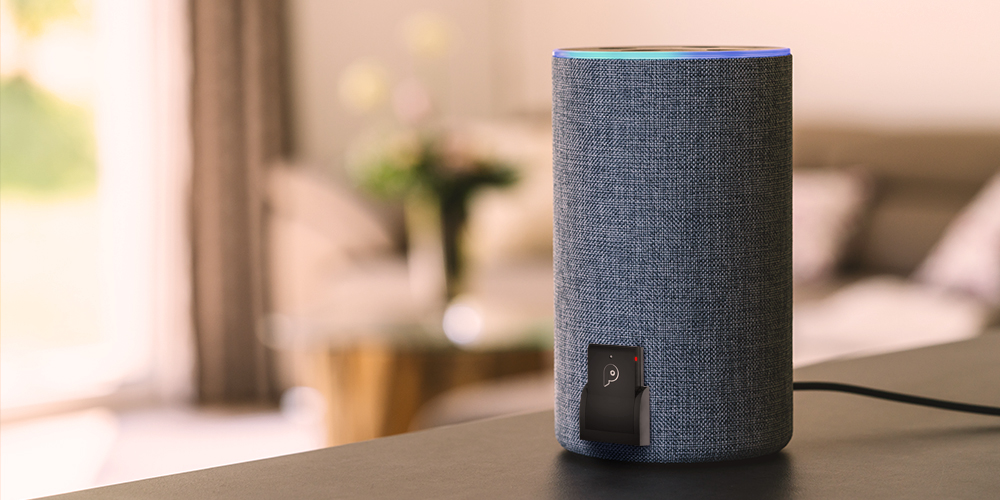This is a continuation of the first article, where we imagined a series of strategies Ori (our fictional alien creature) might employ in an attempt to defeat Paranoid. Try as he might, Ori couldn’t concoct a way to regain the ability to listen in on our conversations.
So, Ori, how are you doing during this pandemic?
Ori: Livin’ my best life, human. With people sheltering in place, right next to their smart speakers, the data stream never stops. Better yet, tons of people are working at home. So, I’m getting business secrets as well as personal ones.
Except in those homes with Paranoid installed.
Speaking of Paranoid, has the internet delivered any good strategies for getting around it?
Ori: Plenty. For example, Google or Amazon could send an update to the smart speaker that will make it say Paranoid’s wake word—thus automatically defeating it. Booyah!
But the smart speaker’s owner would hear that if it happened. Doesn’t sound very sneaky to me. That said, I will give you points for bringing “booyah” back …
Ori: The smart speaker would say the wake word ultrasonically. So, you humans won’t hear it but the Paranoid microphone will. You know, like a dog whistle but smarter.
Unfortunately for you, Paranoid has protection against ultrasonic attacks. Even if one were to slip through, Paranoid would then require the smart speaker to shine its lights; otherwise it cuts it off almost immediately. That said, we’d frankly be flattered if Big Data ever went to such extraordinary lengths to tamper with us.
Ori: Gaaah! Fine. Then, let’s see what else the internet has to suggest.
Hmmm… “So by adding another device that is listening, to my device that is already listening, I’ll be safer from companies listening to my conversations.” Well, that user clearly doesn’t get it. We already know Paranoid can’t upload a single word it hears, so it doesn’t really matter that it’s always listening. C’mon, humans, give me something to work with here!
Aha, here we go. Check out this reply: “So seems pretty secure unless the attack vector is that the device does in fact store some speech and then use inactive times to send it forward via smart speaker.” Aww, yeah! In other words, Paranoid could store people’s conversations and secretly transmit them to the smart speaker later, when no one’s around.
Except for the fact that Paranoid has no hardware that would enable it to store more than a few seconds of people’s conversations. Even if it did have enough onboard memory, any tech enthusiast with basic knowledge could take Paranoid apart and post a teardown video. Within days, the scandal would be revealed to the entire world.
The company behind Paranoid is built on blocking you, Ori, not colluding with you.
In any case, how exactly would Paranoid transmit the recordings to the smart speaker, with no data connection? By speaking them aloud? Again, that doesn’t sound particularly sneaky.
So, no, Paranoid can’t record your secrets, and can’t transmit data to a smart speaker. That theory is just another dead end.
Ori: How about this? Paranoid might stop the smart speaker’s MICROPHONE from listening, but what if the speakers’ function were reversed? Speakers can be operated as microphones, so I would have a whole new way of listening in.
That’s not feasible, but I will give you points for creativity. Speakers can indeed function as microphones—provided they are wired to do so. That said, Google and Amazon would have to connect the speakers to additional electronics before they could act as mics. And, if they did so, anybody with enough technical knowledge could reverse engineer the printed circuit board, discover the ruse, and blow the whistle. It would be a massive scandal.
In fact, Paranoid’s engineers will check for this for each device we add to the compatibility list. So, that’s that. What else have you got?
Ori: This next commenter just might be my new favorite human: “I own an Echo full well knowing it could listen to and track me whenever Amazon wants regardless if they say they don’t. There is always something, so why even bother? I have nothing to hide.”
Ah, yes, the old “privacy is dead so let’s all give up” argument. I can see why you’re a fan. If everybody follows this user’s lead and simply stops caring about their digital privacy, the world turns into one giant data buffet for you, Ori.
The funny thing about people who insist they “have nothing to hide”: you don’t see them sharing their social security numbers in their Twitter profiles.
Ori: Fair enough … but there’s more than one way to hack someone’s social security number.
Moving right along … Here’s another one. “Until it’s revealed that Paranoid got hacked and all info got leaked to Facebook or Google. We all know how this works.”
Ah, if only that were true. Apparently, ol’ “TL;DR” here clearly doesn’t know how this all works. They need to take a few minutes to read the first blog. Paranoid can’t store data and has no way to connect to the internet. Hacking it would be about as easy as hacking a rock.
Ha! You are so right. If these online experts could invent a device that transmitted data while not being connected to the internet, they’d be busy spending all their billions, not trolling the internet.
Ori: Curse you, social media! You promised me some strategies to hack Paranoid, but you totally let me down. The rest of the comments on here don’t even come close. In fact, some of them are downright depressing. Like this one: “Here is the company that wants to take your money to actually prevent others from stealing and selling your personal life on the Internet. The more of these products that come out the better.”
Yep. I couldn’t have said it more eloquently myself. It’s time to reclaim our online privacy. Get Paranoid.


